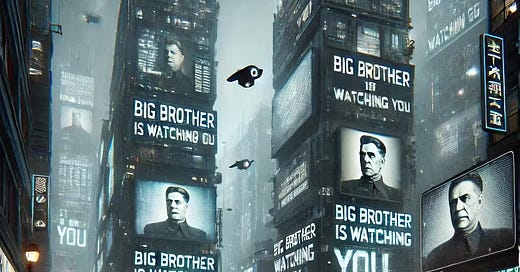How George Orwell’s 1984 Became a Reality from 2020 to 2024
Few works of literature have remained as relevant and prophetic as George Orwell’s 1984. Published in 1949, the novel was intended as a dystopian warning about the dangers of totalitarianism, mass surveillance, thought control, and state propaganda. While its themes have echoed throughout modern history, the years 2020 to 2024 saw an unprecedented acceleration of Orwellian mechanisms, making his vision disturbingly real. Governments across the world, particularly in Western nations, adopted policies and technologies that mirrored the oppressive rule of Big Brother. The COVID-19 pandemic, political upheavals, censorship, and mass surveillance all played a part in shaping a world that eerily resembled Orwell’s vision. From the erosion of free speech and the manipulation of truth to the rise of a technocratic elite controlling every aspect of daily life, Orwell’s warnings no longer seemed theoretical—they became the lived experience of millions.
The most striking parallel between 1984 and the 2020-2024 period was the role of state-enforced narratives and censorship. In Orwell’s world, the Party controlled truth through the Ministry of Truth, where history was rewritten to fit the present agenda. Similarly, governments, social media companies, and mainstream media outlets aggressively controlled narratives under the guise of combating “misinformation” and “disinformation.” Throughout the COVID-19 pandemic, any dissenting views on lockdowns, vaccines, or alternative treatments were ruthlessly censored. The suppression of the Hunter Biden laptop story in 2020, which could have influenced the presidential election, was another clear example of information control. Those who questioned election integrity in 2020 or spoke out against state-sponsored narratives on social justice issues were de-platformed, fired, or labeled as extremists. Orwell’s Two Minutes Hate, where citizens were forced to denounce enemies of the Party, found its real-world counterpart in cancel culture and mass social shaming.
Surveillance and the erosion of privacy also reached Orwellian levels. The rise of digital passports, mass data collection, and AI-driven surveillance mirrored the Party’s omnipresent control over its citizens. Governments implemented vaccine passports, requiring digital proof of vaccination for basic freedoms such as travel, dining, and employment. In Orwell’s world, telescreens monitored every move of citizens; in 2020-2024, smartphones, social media algorithms, and artificial intelligence served the same purpose. Programs like the U.S. government’s partnership with tech companies to monitor “domestic extremism” and the European Union’s push for digital IDs showed that the state’s ability to track, monitor, and control individuals had reached new heights. China’s social credit system, where citizens are rewarded or punished based on government-approved behavior, began to influence Western policies, with banks and corporations de-banking individuals based on their political opinions. The dystopian concept of “thoughtcrime” became real, as people were prosecuted or socially ostracized for their private opinions, even if they had never acted on them.
Another Orwellian development was the manipulation of language and reality itself, through the widespread use of doublespeak and thought control. In 1984, the Party controls thought by redefining words and banning certain forms of expression, a practice known as Newspeak. From 2020 to 2024, language was weaponized like never before. Terms like “woman” were redefined to fit ideological agendas, while new terms like “Latinx” and “birthing person” were forced into official discourse despite public rejection. The concept of “equity” replaced “equality,” shifting focus from equal opportunity to enforced outcomes based on race, gender, or ideology. Political doublespeak was rampant—fiery riots were called “peaceful protests,” while legitimate political demonstrations were labeled “insurrections.” Orwell’s doublethink, the ability to hold two contradictory beliefs simultaneously, was essential in navigating the shifting sands of mainstream narratives. One day, masks were deemed useless; the next, they were essential; later, questioning their effectiveness was labeled as conspiracy. The past was rewritten in real time, just as Orwell predicted.
Finally, the authoritarian overreach of governments, particularly during crises, reflected Orwell’s perpetual state of war and control through fear. In 1984, the Party keeps the population in a constant state of fear, ensuring obedience through never-ending external threats. In 2020, the COVID-19 crisis was used to justify sweeping emergency powers, from indefinite lockdowns to forced vaccinations. Later, climate change and the “war on domestic terrorism” replaced the pandemic as justification for increasing government control. Orwell’s concept of unpersoning, where political dissidents were erased from history, became a reality through widespread de-platforming and censorship. Bank accounts were frozen for protesters, as seen in Canada’s trucker protests, and the U.S. government even created a Disinformation Governance Board—essentially a modern Ministry of Truth—before public backlash forced its shutdown. From digital currencies controlled by central banks to AI-driven censorship, the mechanisms of control Orwell warned about were put into place at a breathtaking pace. The world had moved from "democracy" to technocracy, where unelected bureaucrats and global elites dictated every aspect of life.
What Orwell envisioned as a warning became a lived experience in the early 2020s. The technological advancements that promised greater freedom were instead harnessed for control, and the institutions that once upheld "democracy" turned into instruments of suppression. The widespread acceptance of mass surveillance, censorship, and propaganda means that the world of 1984 is no longer a work of fiction—it is the new normal. If people fail to recognize these developments for what they are, and if they do not push back against the creeping authoritarianism, the future will hold a reality even darker than Orwell ever imagined. The question remains: Will society wake up before it is too late, or is Big Brother here to stay?




